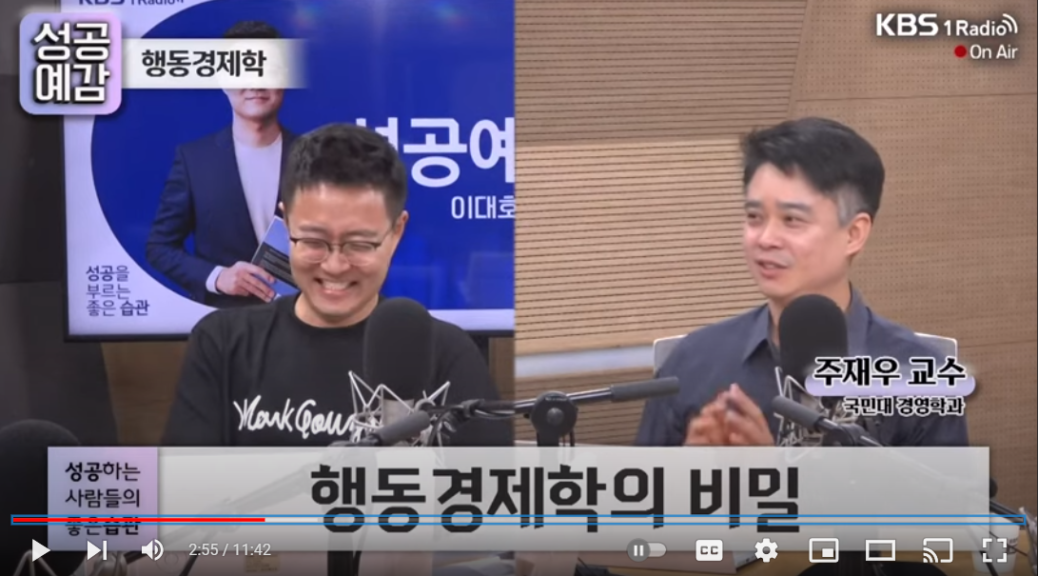오늘 주제는 교수님의 경험담이라고요. 어떤 일이 있었던 겁니까?
“10여년 전 문을 연 프리미엄 식료품 판매 매장에서 파스타를 사다가, 반년 후 동일한 제품을 싸게 파는 일반 매장을 발견해서 그곳에서 구매하기 시작했어요. 그런데 제 아내는 가격이 더 비싸더라도 프리미엄 매장에서 사자고 제안했어요. 동일한 제품에 돈을 더 내려는 비합리적인 이유를 처음에는 이해할 수 없었어요.”
2023.08.10
#행동경제학 의 비밀
– #절정#대미 의 법칙 의미와 실생활 적용
– 최고의 순간과 마지막 순간의 기억을 위한 #마케팅
– #주재우 교수 (국민대 경영학과) #kbs1라디오#라디오#KBS라디오#시사라디오#KBS1Radio#성공예감이대호입니다#성공예감#이대호
***
Reference
Redelmeier, D. A., & Kahneman, D. (1996). Patients’ memories of painful medical treatments: Real-time and retrospective evaluations of two minimally invasive procedures. pain, 66(1), 3-8.
Abstract
Patients’ memories of painfu lmedical procedures may influence their decisions about future treatments, yet memories are imperfect and susceptible to bias. We recorded in real-time the intensity of pain experienced by patients undergoing colonoscopy (n = 154) and lithotripsy (n = 133). We subsequently examined patients’ retrospective evaluations of the total pain of the procedure, and related these evaluations to the real-time recording obtained during the experience. We found that individuals varied substantially in the total amount of pain they remembered. Patients’ judgments of total pain were strongly correlated with the peak intensityof pain (P < 0.005) and with the intensity of pain recorded during the last 3 min of the procedure (P < 0.005). Despite substantial variation in the duration of the experience, lengthy procedures were not remembered as particularly aversive. We suggest that patients’ memories of painful medical procedures largely reflect the intensity of pain at the worst part and at the final part of the experience.
Keywords
Medical treatment and pain; Memory; Colonoscopy; Lithotripsy; Pain intensity

“We found no significant correlation between the duration of the procedure and retrospective evaluations—a striking illustration of Duration Neglect.” (pg. 6)
“Patients’ retrospective evaluations were strongly correlated with Peak Pain and End Pain.” (pg. 6)
“In accord with laboratory research, patients’ memories of the overall pain of both colonoscopy and lithotripsy were characterized by Peak and End Evaluation and Duration Neglect…” (pg. 7)
“The discrepancy between people’s real-time and retrospective evaluations is not surprising given the limitations of human memory and judgment.” (pg. 7)
“Peak and End Evaluation and Duration Neglect have significant implications for how clinicians conduct painful medical procedures.If the objective is to reduce patients’memory of pain, for example, lowering the peak intensity of pain could be more important than minimizing the duration of the procedure. By the same reasoning, gradual relief may be preferable to abrupt relief if patients retain a less aversive memory when the intense pain does not occur near the end of the procedure. In contrast, if the objectiveis to reduce the amount of pain actually experienced, conducting the procedure swiftly may be appropriate even if doing so increases the peak pain intensity and leaves patients with a particularly aversive memory.” (pg. 7)

